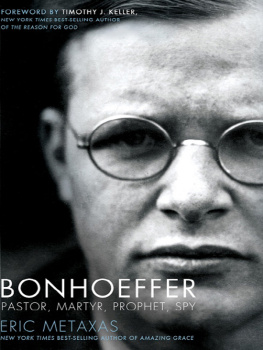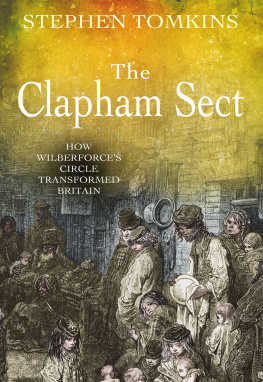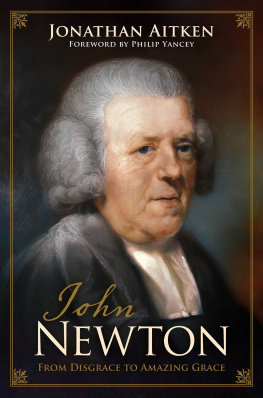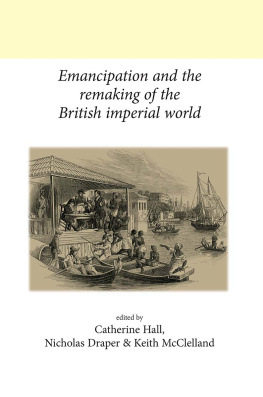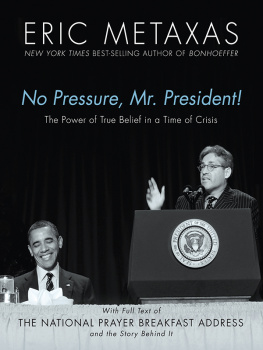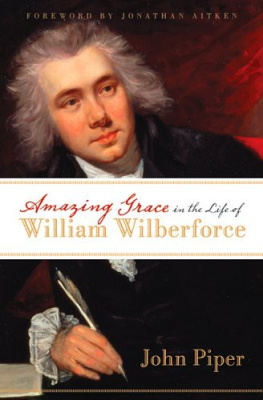Historys landscape is littered with great people whose names have disappeared from the rolls of our collective memory. Such has been the unfortunate fate that befell the heroic William Wilberforce. Wilberforcehumanitarian, parliamentarian, and voice of the voicelessfatefully receded somewhere into the far-off memory of Americans over the past century. Wilberforce and his name once stood as monuments to freedom, faith, and humanity. Were Abraham Lincoln and Frederick Douglass to cite their sources of inspiration, Wilberforce would be high, if not first, on their lists. Today, that memory is resurrected in this magnificent book.
Eric Metaxass work will stand as a living landmark not so much for its obviously beautiful prose and detailed narrative of the life of Wilberforce, but because it artfully captures the essence of a spiritual strength, moral clarity, human frailty, and divine purpose that dwelled among men at the end of the eighteenth century and beginning of the nineteenth. Bold men and women, Wilberforce first among equals, challenged the prevailing currents of their time to eradicate the scourge of the slave trade. Ultimately, their strategies, defeats, and victories mounted up with wings like eagles to call attention to slavery as more than just a peculiar institution. In Wilberforces mind, there was nothing peculiar about slavery. Peculiar to him was the ability of so many refined and seemingly polite members of society to stomach slaverys bile and to turn a deaf ear to the cries of millions. To Wilberforce, slavery and other civil ills were forces that destroyed life and its viability. As a result of his courage and efforts, freedoms bell was rung for millions and the thirst for liberty has continued to echo throughout history.
William Wilberforces courage, zeal, and actions as recounted in this biography are a modern reminder of work unfinished. That he suffered from poor health likewise reminds that even in the context of human weakness, divine work can still attend. His situation begs the question, What can I do today?
Today, in every corner of the world (the United States and Great Britain are not exempt), there remains great work to do. Slavery in Africa is still a reality. Today, the filthy ships of European slave traders are dry-docked in our distant memory, but human beings are still stripped of their essence and exported to far-off and hostile places. In too many corners of Asia, Eastern Europe, the Americas, and the Middle East, trafficking in women to serve the baser desires of men is thriving; work unfinished remains.
Scripture is bursting with admonitions to remember. There is power in remembrance, recalling, and memorial celebration. This biography allows us to place Wilberforce in two contexts and to witness the miracles that still occur.
First, Metaxass biography allows us to put into crystal-clear focus the life of a man born to comfort but discomforted by the dire conditions of suffering people. Wilberforce saw the chemistry of oppression as changing the oppressor as well as the oppressed. In his own available way, he acted boldly to change the world. This boldness, while temporarily forgotten in human history, is ultimately honored and rewarded by Heaven itself.
In a second way, Metaxass work on Wilberforces life allows us to witness that God has not finished His creative work. Like Wilberforce, we have the ability to create a better world, that beloved community of which Jesus Christ and the prophets spoke.
Wilberforces obsession with slaverys end was a blessing to those he would never know. Blind acts of love are often redemptivesometimes painful, but always redemptive. Wilberforces early defeats and setbacks early in his legislative life were all vindicated by his delayed victory in the House of Commons years after he introduced his first antislavery measure; love is indeed longsuffering, as we are reminded in Pauls epistle to the nascent church in late ancient Corinth. His real redemption and justification were not accomplished during his lifetime nor in the House of Commons. The greatest benefits of his work and toiling are still being realized when oppression is confronted today, racism is challenged everywhere, and a better, more loving world is ultimately created.
The single greatest institutional memorial to Wilberforce is the university that bears his name. One hundred fifty-one years ago, men and women joined head and heart across the lines of race, class, and confessional statements to create Americas first private historically black college and university. Not in London, but in the states of the former British colony, stands an African-American college as a memorial to a white British Member of Parliament. The irony is not lost.
At the time of the universitys establishment, there was polite conversation in Americas parlors and colleges about the basic humanity of African Americans. Even more unrealistic for many in that conversation was the ability of African Americans to learn, contribute to society, and exist beyond the pale of forced servitude.
Today, Wilberforce University welcomes many of Americas poorest and most underserved populations and transforms their educational dreams into realities. The average household income of Wilberforce students hovers just above the nations poverty line, but its students have not surrendered their hunger for excellence and thirst for achievement in the midst of economic and social challenge.
In one small town named Wilberforce, Ohio, Wilberforces legacy was never forgotten. At every commencement, the Wilberforce Bible is read, and in the margins are the unmistakable musings and notes of none other than William Wilberforce. Thousands of African Americans, Afro-Caribbeans, and Africans have presented their minds, bodies, and spirits at an altar of educational improvement. As a result, countless physicians, educators, lawyers, presidents of liberated African nations, members of Congress, and church leaders have graduated from Wilberforce University and now make the world a better place. It is more than ironic that in one of the few places where his name is remembered that miracles continue to happen every single day.
Lest we forget seems a fitting admonition in present times, in the midst of changes whirlwind. As the world recognizes Wilberforce, his work, and his Savior, let us not fall into former pits of forgetfulness.
Floyd Flake
President, Wilberforce University, former U.S. Congressman (NY),
and author of Practical Virtues and The Way of the Bootstrapper
We often hear about people who need no introduction, but if ever someone did need one, at least in our day and age, its William Wilberforce. The strange irony is that we are talking about a man who changed the world, so if ever someone should not need an introductionwhose name and accomplishments should be on the lips of all humanityits Wilberforce.
What happened is surprisingly simple: William Wilberforce was the happy victim of his own success. He was like someone who against all odds finds the cure for a horrible disease thats ravaging the world, and the cure is so overwhelmingly successful that it vanquishes the disease completely. No one suffers from it againand within a generation or two no one remembers it ever existed.
The roots of the thing Wilberforce was trying to uproot had been growing since humans first walked on the planet, and if they had been real roots, they would have reached to the molten core of the earth itself. They ran so deep and so wide that most people thought that they held the planet together.
The opposition that he and his small band faced was incomparable to anything we can think of in modern affairs. It was certainly unprecedented that anyone should endeavor, as if by their own strength and a bit of leverage, to tip over something about as large and substantial and deeply rooted as a mountain range. From where we stand todayand because of Wilberforcethe end of slavery seems inevitable, and its impossible for us not to take it largely for granted. But thats the wild miracle of his achievement, that what to the people of his day seemed impossible and unthinkable seems to us, in our day, inevitable.


